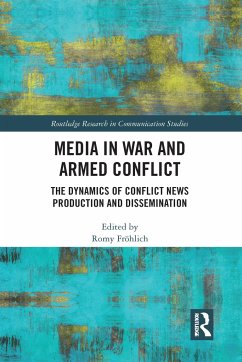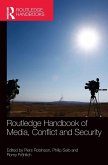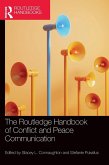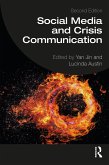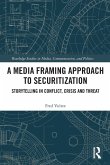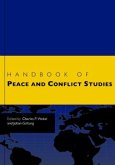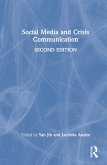Media in War and Armed Conflict
Dynamics of Conflict News Production and Dissemination
Herausgegeben:Fröhlich, Romy
Media in War and Armed Conflict
Dynamics of Conflict News Production and Dissemination
Herausgegeben:Fröhlich, Romy
- Broschiertes Buch
- Merkliste
- Auf die Merkliste
- Bewerten Bewerten
- Teilen
- Produkt teilen
- Produkterinnerung
- Produkterinnerung
This book focuses on the social process of conflict news production and the emergence of public discourse on war and armed conflict. Its contributions combine qualitative and quantitative approaches through interview studies and computer-assisted content analysis and apply a unique comparative and holistic approach over time, across different cycles of six conflicts in three regions of the world, and across different types of domestic, international and transnational media. In so doing, it explores the roles of public communication through traditional media, social media, strategic…mehr
Andere Kunden interessierten sich auch für
![Routledge Handbook of Media, Conflict and Security Routledge Handbook of Media, Conflict and Security]() Routledge Handbook of Media, Conflict and Security241,99 €
Routledge Handbook of Media, Conflict and Security241,99 €![Social Media Theory and Communications Practice Social Media Theory and Communications Practice]() Whitney LehmannSocial Media Theory and Communications Practice44,99 €
Whitney LehmannSocial Media Theory and Communications Practice44,99 €![The Routledge Handbook of Conflict and Peace Communication The Routledge Handbook of Conflict and Peace Communication]() The Routledge Handbook of Conflict and Peace Communication237,99 €
The Routledge Handbook of Conflict and Peace Communication237,99 €![Social Media and Crisis Communication Social Media and Crisis Communication]() Social Media and Crisis Communication41,99 €
Social Media and Crisis Communication41,99 €![A Media Framing Approach to Securitization A Media Framing Approach to Securitization]() Fred VulteeA Media Framing Approach to Securitization44,99 €
Fred VulteeA Media Framing Approach to Securitization44,99 €![Handbook of Peace and Conflict Studies Handbook of Peace and Conflict Studies]() Handbook of Peace and Conflict Studies55,99 €
Handbook of Peace and Conflict Studies55,99 €![Social Media and Crisis Communication Social Media and Crisis Communication]() Social Media and Crisis Communication148,99 €
Social Media and Crisis Communication148,99 €-
-
-
This book focuses on the social process of conflict news production and the emergence of public discourse on war and armed conflict. Its contributions combine qualitative and quantitative approaches through interview studies and computer-assisted content analysis and apply a unique comparative and holistic approach over time, across different cycles of six conflicts in three regions of the world, and across different types of domestic, international and transnational media. In so doing, it explores the roles of public communication through traditional media, social media, strategic communication, and public relations in informing and involving national and international actors in conflict prevention, resolution and peace-keeping. It provides a key point of reference for creative, innovative, and state-of-the-art empirical research on media and armed conflict.
Produktdetails
- Produktdetails
- Routledge Research in Communication Studies
- Verlag: Routledge / Taylor & Francis
- Seitenzahl: 370
- Erscheinungstermin: 30. Juni 2020
- Englisch
- Abmessung: 229mm x 152mm x 20mm
- Gewicht: 535g
- ISBN-13: 9780367583613
- ISBN-10: 0367583615
- Artikelnr.: 69892568
- Herstellerkennzeichnung
- Libri GmbH
- Europaallee 1
- 36244 Bad Hersfeld
- gpsr@libri.de
- Routledge Research in Communication Studies
- Verlag: Routledge / Taylor & Francis
- Seitenzahl: 370
- Erscheinungstermin: 30. Juni 2020
- Englisch
- Abmessung: 229mm x 152mm x 20mm
- Gewicht: 535g
- ISBN-13: 9780367583613
- ISBN-10: 0367583615
- Artikelnr.: 69892568
- Herstellerkennzeichnung
- Libri GmbH
- Europaallee 1
- 36244 Bad Hersfeld
- gpsr@libri.de
Romy Fröhlich is Professor at the Institute of Communication Studies and Media Research at Ludwig-Maximilians-Universität (LMU) München, Germany.
Foreword
Scott Althaus
Part I: Comparative, Diachronic and Holistic: Conceptualising Theoretical Paths for the Analysis of Conflict News Coverage and Public Discourse on Armed Conflicts
Introduction
Romy Fröhlich
1. Dissecting Media Roles in Conflict: A Transactionist Process Model of Conflict News Production, Dissemination, and Influence
Christian Baden & Christoph O. Meyer
Part II: The Dynamics of Public Discourse(s) on Wars and Armed Conflicts: Media Content, Strategic Communication and Conflict-Related Cognition
2. Not so Bad News? Investigating Journalism's Contribution to What's Bad, and Good, in News on Violent Conflict
Christian Baden & Keren Tenenboim-Weinblatt
3. The Dynamics of Strategic Communication over Time: Patterns of Persuasive Communication and its Relevance for the Construction of Discourse on War and Conflict
Romy Fröhlich & Marc Jungblut
4. The Dynamics of Parliamentary Debates on War and Conflict: Assessing the Impact and Role of the Media on the Political Agenda
Rosa Berganza, Beatriz Herrero-Jiménez & Adolfo Carratalá
5. #iProtest: The Case of the Colourful Revolution in Macedonia
Dimitra Dimitrakopoulou & Sergios Lenis
Part III: The Dynamics of Conflict News Production as a Social Process: Key Actors' (Changing) Roles and Their Interrelations
6. Journalism of War and Conflict: Generic and Conflict-related Influences on News Production
Thomas Hanitzsch & Abit Hoxha
7. The enduring value of reliable facts: Why NGOs have become more influential in conflict discourse
Eric Sangar & Christoph O. Meyer
8. Political Leaders, Media, and Violent Conflict in the Digital Age
Gadi Wolfsfeld & Linor Tsifroni
9. A Game of Frames in Conflict Transformation: Mapping the Media Active Publics' Nexus of Competing Conflict Frames
Igor Micevski and Snezana Trpevska
10. Balancing plausible lies and false truths: Perception and evaluation of the local and global news coverage of conflicts in the DRC
Marie-Soleil Frère & Anke Fiedler
Part IV: Recapitulation, Consolidation, Implication
11. The Integration of Findings: Consequences of Empirical Results for the Advancement of Theory Building
Romy Fröhlich
(In cooperation with Christian Baden, Rosa Berganza, Dimitra Dimitrakopoulou, Thomas Hanitzsch, Beatriz Herrero-Jiménez, Abit Hoxha, Marc Jungblut, Christoph O. Meyer, Igor Micevski, Eric Sangar, Keren Tenenboim-Weinblatt, and Snezana Trpevska)
12. Practical Implications and Suggestions for the Applied Fields: Journalism, Media Assistance, NGOs and Politics"
Romy Fröhlich
(In cooperation with Christian Baden, Rosa Berganza, Dimitra Dimitrakopoulou, Thomas Hanitzsch, Beatriz Herrero-Jiménez, Marc Jungblut, Christoph O. Meyer, Igor Micevski, Eric Sangar, Keren Tenenboim-Weinblatt and Snezana Trpevska)
Afterword
Philip Seib
Scott Althaus
Part I: Comparative, Diachronic and Holistic: Conceptualising Theoretical Paths for the Analysis of Conflict News Coverage and Public Discourse on Armed Conflicts
Introduction
Romy Fröhlich
1. Dissecting Media Roles in Conflict: A Transactionist Process Model of Conflict News Production, Dissemination, and Influence
Christian Baden & Christoph O. Meyer
Part II: The Dynamics of Public Discourse(s) on Wars and Armed Conflicts: Media Content, Strategic Communication and Conflict-Related Cognition
2. Not so Bad News? Investigating Journalism's Contribution to What's Bad, and Good, in News on Violent Conflict
Christian Baden & Keren Tenenboim-Weinblatt
3. The Dynamics of Strategic Communication over Time: Patterns of Persuasive Communication and its Relevance for the Construction of Discourse on War and Conflict
Romy Fröhlich & Marc Jungblut
4. The Dynamics of Parliamentary Debates on War and Conflict: Assessing the Impact and Role of the Media on the Political Agenda
Rosa Berganza, Beatriz Herrero-Jiménez & Adolfo Carratalá
5. #iProtest: The Case of the Colourful Revolution in Macedonia
Dimitra Dimitrakopoulou & Sergios Lenis
Part III: The Dynamics of Conflict News Production as a Social Process: Key Actors' (Changing) Roles and Their Interrelations
6. Journalism of War and Conflict: Generic and Conflict-related Influences on News Production
Thomas Hanitzsch & Abit Hoxha
7. The enduring value of reliable facts: Why NGOs have become more influential in conflict discourse
Eric Sangar & Christoph O. Meyer
8. Political Leaders, Media, and Violent Conflict in the Digital Age
Gadi Wolfsfeld & Linor Tsifroni
9. A Game of Frames in Conflict Transformation: Mapping the Media Active Publics' Nexus of Competing Conflict Frames
Igor Micevski and Snezana Trpevska
10. Balancing plausible lies and false truths: Perception and evaluation of the local and global news coverage of conflicts in the DRC
Marie-Soleil Frère & Anke Fiedler
Part IV: Recapitulation, Consolidation, Implication
11. The Integration of Findings: Consequences of Empirical Results for the Advancement of Theory Building
Romy Fröhlich
(In cooperation with Christian Baden, Rosa Berganza, Dimitra Dimitrakopoulou, Thomas Hanitzsch, Beatriz Herrero-Jiménez, Abit Hoxha, Marc Jungblut, Christoph O. Meyer, Igor Micevski, Eric Sangar, Keren Tenenboim-Weinblatt, and Snezana Trpevska)
12. Practical Implications and Suggestions for the Applied Fields: Journalism, Media Assistance, NGOs and Politics"
Romy Fröhlich
(In cooperation with Christian Baden, Rosa Berganza, Dimitra Dimitrakopoulou, Thomas Hanitzsch, Beatriz Herrero-Jiménez, Marc Jungblut, Christoph O. Meyer, Igor Micevski, Eric Sangar, Keren Tenenboim-Weinblatt and Snezana Trpevska)
Afterword
Philip Seib
Foreword
Scott Althaus
Part I: Comparative, Diachronic and Holistic: Conceptualising Theoretical Paths for the Analysis of Conflict News Coverage and Public Discourse on Armed Conflicts
Introduction
Romy Fröhlich
1. Dissecting Media Roles in Conflict: A Transactionist Process Model of Conflict News Production, Dissemination, and Influence
Christian Baden & Christoph O. Meyer
Part II: The Dynamics of Public Discourse(s) on Wars and Armed Conflicts: Media Content, Strategic Communication and Conflict-Related Cognition
2. Not so Bad News? Investigating Journalism's Contribution to What's Bad, and Good, in News on Violent Conflict
Christian Baden & Keren Tenenboim-Weinblatt
3. The Dynamics of Strategic Communication over Time: Patterns of Persuasive Communication and its Relevance for the Construction of Discourse on War and Conflict
Romy Fröhlich & Marc Jungblut
4. The Dynamics of Parliamentary Debates on War and Conflict: Assessing the Impact and Role of the Media on the Political Agenda
Rosa Berganza, Beatriz Herrero-Jiménez & Adolfo Carratalá
5. #iProtest: The Case of the Colourful Revolution in Macedonia
Dimitra Dimitrakopoulou & Sergios Lenis
Part III: The Dynamics of Conflict News Production as a Social Process: Key Actors' (Changing) Roles and Their Interrelations
6. Journalism of War and Conflict: Generic and Conflict-related Influences on News Production
Thomas Hanitzsch & Abit Hoxha
7. The enduring value of reliable facts: Why NGOs have become more influential in conflict discourse
Eric Sangar & Christoph O. Meyer
8. Political Leaders, Media, and Violent Conflict in the Digital Age
Gadi Wolfsfeld & Linor Tsifroni
9. A Game of Frames in Conflict Transformation: Mapping the Media Active Publics' Nexus of Competing Conflict Frames
Igor Micevski and Snezana Trpevska
10. Balancing plausible lies and false truths: Perception and evaluation of the local and global news coverage of conflicts in the DRC
Marie-Soleil Frère & Anke Fiedler
Part IV: Recapitulation, Consolidation, Implication
11. The Integration of Findings: Consequences of Empirical Results for the Advancement of Theory Building
Romy Fröhlich
(In cooperation with Christian Baden, Rosa Berganza, Dimitra Dimitrakopoulou, Thomas Hanitzsch, Beatriz Herrero-Jiménez, Abit Hoxha, Marc Jungblut, Christoph O. Meyer, Igor Micevski, Eric Sangar, Keren Tenenboim-Weinblatt, and Snezana Trpevska)
12. Practical Implications and Suggestions for the Applied Fields: Journalism, Media Assistance, NGOs and Politics"
Romy Fröhlich
(In cooperation with Christian Baden, Rosa Berganza, Dimitra Dimitrakopoulou, Thomas Hanitzsch, Beatriz Herrero-Jiménez, Marc Jungblut, Christoph O. Meyer, Igor Micevski, Eric Sangar, Keren Tenenboim-Weinblatt and Snezana Trpevska)
Afterword
Philip Seib
Scott Althaus
Part I: Comparative, Diachronic and Holistic: Conceptualising Theoretical Paths for the Analysis of Conflict News Coverage and Public Discourse on Armed Conflicts
Introduction
Romy Fröhlich
1. Dissecting Media Roles in Conflict: A Transactionist Process Model of Conflict News Production, Dissemination, and Influence
Christian Baden & Christoph O. Meyer
Part II: The Dynamics of Public Discourse(s) on Wars and Armed Conflicts: Media Content, Strategic Communication and Conflict-Related Cognition
2. Not so Bad News? Investigating Journalism's Contribution to What's Bad, and Good, in News on Violent Conflict
Christian Baden & Keren Tenenboim-Weinblatt
3. The Dynamics of Strategic Communication over Time: Patterns of Persuasive Communication and its Relevance for the Construction of Discourse on War and Conflict
Romy Fröhlich & Marc Jungblut
4. The Dynamics of Parliamentary Debates on War and Conflict: Assessing the Impact and Role of the Media on the Political Agenda
Rosa Berganza, Beatriz Herrero-Jiménez & Adolfo Carratalá
5. #iProtest: The Case of the Colourful Revolution in Macedonia
Dimitra Dimitrakopoulou & Sergios Lenis
Part III: The Dynamics of Conflict News Production as a Social Process: Key Actors' (Changing) Roles and Their Interrelations
6. Journalism of War and Conflict: Generic and Conflict-related Influences on News Production
Thomas Hanitzsch & Abit Hoxha
7. The enduring value of reliable facts: Why NGOs have become more influential in conflict discourse
Eric Sangar & Christoph O. Meyer
8. Political Leaders, Media, and Violent Conflict in the Digital Age
Gadi Wolfsfeld & Linor Tsifroni
9. A Game of Frames in Conflict Transformation: Mapping the Media Active Publics' Nexus of Competing Conflict Frames
Igor Micevski and Snezana Trpevska
10. Balancing plausible lies and false truths: Perception and evaluation of the local and global news coverage of conflicts in the DRC
Marie-Soleil Frère & Anke Fiedler
Part IV: Recapitulation, Consolidation, Implication
11. The Integration of Findings: Consequences of Empirical Results for the Advancement of Theory Building
Romy Fröhlich
(In cooperation with Christian Baden, Rosa Berganza, Dimitra Dimitrakopoulou, Thomas Hanitzsch, Beatriz Herrero-Jiménez, Abit Hoxha, Marc Jungblut, Christoph O. Meyer, Igor Micevski, Eric Sangar, Keren Tenenboim-Weinblatt, and Snezana Trpevska)
12. Practical Implications and Suggestions for the Applied Fields: Journalism, Media Assistance, NGOs and Politics"
Romy Fröhlich
(In cooperation with Christian Baden, Rosa Berganza, Dimitra Dimitrakopoulou, Thomas Hanitzsch, Beatriz Herrero-Jiménez, Marc Jungblut, Christoph O. Meyer, Igor Micevski, Eric Sangar, Keren Tenenboim-Weinblatt and Snezana Trpevska)
Afterword
Philip Seib

